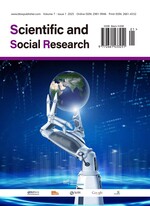Abstract
Research objectives: China attaches great importance to carrying forward, developing, and innovating the excellent traditional Chinese culture. This is to inherit and carry forward the excellent traditional Chinese culture that is important. Traditional Chinese medicine exercise therapy is an important part of traditional Chinese medicine that should also be preserved. However, under the diversified impact of modern society, its cultural identity is lacking and the inheritance predicament is difficult. Therefore, this paper explores the inheritance crisis of traditional Chinese sports therapy from the perspective of cultural identity. Research methods: Literature, interviews, and logical analysis are performed. Results and analysis: There are some problems in the process of inheriting traditional exercise therapy, such as a fuzzy sense of identity, anxiety about inheriting identity, and over-commercialization. Suggestion: The inheritance of TCM traditional exercise therapy needs the concerted efforts of all sectors of society, strengthening the construction of teaching staff, coordinating the relationship between inheritance and modern education, multi-directional, multi-angle, and multi-level publicity, and telling the story of TCM traditional exercise therapy well.
References
Zhang CM, 2024, Hongdong: Inheriting Traditional Chinese Medicine Culture and Building Healthy Hometown. Linfen Daily, 2024, November 25, 3.
Wang ZX, 2021, Research on Physical Education Reform in Traditional Chinese Medicine Colleges under the background of “Combination of Sports and Medicine”. Sporting Goods and Technology, 2021(15): 163–164.
Lai QY, Jing CX, Jiao RY, et al., 2014, Research on Traditional Sports Health Care Course for Sports Medicine Master in Traditional Chinese Medicine Colleges — A Case Study of Guangzhou University of Traditional Chinese Medicine. Science and Technology Vision, 2014(18): 19 + 26.
Yuan CR, Tao P, 2020, The Role of Traditional Exercise Therapy in Overall Health. Chinese Journal of Gerontology, 40(24): 5344–5348.
Yang H, 2024, Research on Taijiquan Promoting Heritage and International Dissemination of Traditional Chinese Medicine, thesis, Nanjing University of Traditional Chinese Medicine.
Sun CH, 2024, Innovative Practice Thinking Based on the Revival and Inheritance of Traditional Chinese Medicine Culture. Journal of Traditional Chinese Medicine Administration, 32(17): 111–113.
Kang JN, 2024, Inheriting the Cultural Treasures of Traditional Chinese Medicine. Kaifeng Daily, 2024, August 22, 3.
Wang JN, Zhang ZY, Liu C, et al., 2024, Study on Cognition and Influencing Factors of Traditional Health Exercise among College Students of Traditional Chinese Medicine. Health Education and Health Promotion, 19(3): 257–259 + 271.
Wang H, Li BN, Gao G, 2022, Study on the Effect of Traditional Exercise Therapy on Physical Health Promotion Under the Background of “Healthy China”. The 7th Guangzhou Sports and Health Conference in 2022 Proceedings of the Kang International Academic Conference.
Xiang JH, 2008, University-enterprise Cooperation to Build a Paperless Digital Public Service Platform. Journal of China University of Science and Technology and Industrialization, 2008(10): 3.
Kuang L, Zhang JM, 2019, Discussion on the Cultural Identity of TCM in TCM colleges and Universities. Education Modernization, 7(25): 70–72 + 108.
Shi H, Zhang ZM, 2024, What Should Be and What Is: Rethinking the Study of Traditional Chinese Medicine Culture. Culture of Traditional Chinese Medicine, 19(5): 486–492.
Li JJ, Jiang YF, Hu XX, 2024, Application of Traditional Chinese Medicine Culture in Training Modern Chinese Medicine Talents. Journal of Chinese Medicine Management, 32(22): 130–132.
Kong HJ, Hu J, Chen C, 2024, Exploration on Talent Training Model of Traditional Chinese Medicine Colleges Enabled by Information Technology. Shi Zhen Chinese Medicine, 35(11): 2684–2686.
Wang GF, Zhang ZG, 2024, The Path of Traditional Chinese Medicine Talent Training Under the Background of Medical Education Collaboration. Chinese Modern Distance Education of Traditional Chinese Medicine, 22(16): 183–186.
